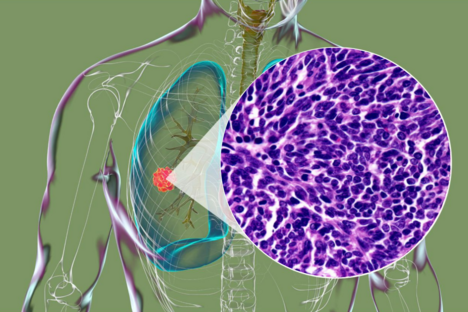博文
小细胞肺癌:克服化学耐药性的新方法
||
小细胞肺癌:克服化学耐药性的新方法
诸平
据奥地利维也纳医科大学(Medical University of Vienna简称MedUni Vienna)2023年9月21日提供的消息,奥地利(Austria)、匈牙利(Hungary)以及瑞典(Sweden)的研究人员合作,研究出:克服小细胞肺癌化学耐药性的新方法(Small cell lung cancer: new approach to overcoming chemo-resistance)。
小细胞肺癌(Small cell lung cancer简称SCLC)约占所有确诊肺癌的15%,仍然与高死亡率有关。SCLC肿瘤往往对化疗产生耐药性,因此预后差是因为肿瘤在初次诊断后仅5~14个月内就复发。最近一项由巴拉兹·德马(Balazs Döme)和卡琳·谢勒奇(Karin Schelch)领导的来自MedUni Vienna的研究表明,抵抗性细胞系可以通过两种现有的治疗药物的组合成功地对抗。这项研究结果于2023年9月19日已经在医学杂志《临床癌症研究》(Clinical Cancer Research)网站发表——Anna Solta, Kristiina Boettiger, Ildikó Kovács, Christian Lang, Zsolt Megyesfalvi, Franziska Ferk, Miroslav Mišík, Konrad Hoetzenecker, Clemens Aigner, Christian R. Kowol, Siegfried Knasmueller, Michael Grusch, Beáta Szeitz, Melinda Rezeli, Balazs Dome, Karin Schelch. Entinostat enhances the efficacy of chemotherapy in small cell lung cancer through S-phase arrest and decreased base excision repair. Clinical Cancer Research, September 19 2023. DOI: 10.1158/1078-0432.CCR-23-1795. 此研究结果为发展治疗这种特别具有侵略性的肿瘤的新疗法提供了一个有希望的方法。
这项研究是在之前由MedUni Vienna的胸外科系(Department of Thoracic Surgery at MedUni Vienna)领导的研究小组的高度重视发现基础上进行的,根据该研究小组的研究结果,小细胞肺癌(SCLC)可以分为不同于化疗药物和靶向药物的亚型。在这种情况下,组蛋白去乙酰化酶抑制剂(histone deaceylase inhibitors简称HDACi)已被证明对两个SCLC亚型(即SCLC-A型和SCLC-N型) 是有效的。HDACi是在实验中已经证明对不同类型的肿瘤细胞有效的药物,现在已经被进一步研究用于SCLC。
联合治疗代替单一治疗(Combination instead of single therapy)
约15%的肺癌患者患有小细胞肺癌(SCLC)。通常发生在吸烟者身上的这种特别具有侵略性的肿瘤生长迅速,并有很高的转移趋势。大约70%的晚期病例在一年内致命。"高死亡率是由于疾病的迅速和几乎不可避免的复发,这往往伴随着对治疗的抵抗,"主要研究者卡琳·谢勒奇概述这个问题时说。在研究过程中,HDACi与标准化疗药物相结合被证明是一种可能的解决方案。这明显减缓了对个体治疗有抵抗力的肿瘤细胞的生长。
破解抵抗机制(Mechanism of resistance deciphered)
在进一步的分析中,还揭示了治疗抵抗的分子机制.因此, MedUni Vienna研究小组的研究结果大大有助于更好地了解SCLC的生物学,在这种疾病中,在治疗创新的发展方面有希望取得的进展已经等待了几十年。"我们的发现可以为研究那些优于SCLC耐药机制的成功新疗法提供基础,"上述论文的第一作者、来自MedUni Vienna胸外科系的安娜·索尔塔(Anna Solta)说, 她还强调了这项研究在临床上的重要性。
参与此项研究的还有来自奥地利维也纳癌症研究所(Institute of Cancer Research, wien, Austria)、瑞典隆德大学(Lund University, Lund, Sweden)、匈牙利塞麦尔维斯大学(Semmelweis University, Budapest, Hungary)等单位的研究人员。
上述介绍,仅供参考。欲了解更多信息,敬请注意浏览原文或者相关报道。
Purpose: Acquired chemoresistance is a frequent event in small cell lung cancer (SCLC), one of the deadliest human malignancies. Histone deacetylase inhibitors (HDACi) have been shown to synergize with different chemotherapeutic agents including cisplatin. Accordingly, we aimed to investigate the dual targeting of HDAC inhibition and chemotherapy in SCLC.
Experimental Design: The efficacy of HDACi and chemotherapy in SCLC was investigated both in vitro and in vivo. Synergistic drug interactions were calculated based on the HSA model (Combenefit software). Results from proteomic analysis was confirmed via ICP-MS, cell cycle analysis, and comet assays.
Results: Single entinostat- or chemotherapy significantly reduced cell viability in human neuroendocrine SCLC cells. The combination of entinostat with either cisplatin, carboplatin, irinotecan, epirubicin, or etoposide led to strong synergy in a subset of resistant SCLC cells. Combination treatment with entinostat and cisplatin significantly decreased tumor growth in vivo. Proteomic analysis comparing the groups of SCLC cell lines with synergistic and additive response patterns indicated alterations in cell cycle regulation and DNA damage repair. Cell cycle analysis revealed that cells exhibiting synergistic drug responses displayed a shift from G1 to S-phase compared to cells showing additive features upon dual treatment. Comet assays demonstrated more DNA damage and decreased base excision repair in SCLC cells more responsive to combination therapy.
Conclusions: In this study, we decipher the molecular processes behind synergistic interactions between chemotherapy and HDAC inhibition. Moreover, we report novel mechanisms to overcome drug resistance in SCLC, which may be relevant to increase the therapeutic success.
https://blog.sciencenet.cn/blog-212210-1403448.html
上一篇:2023年引文桂冠奖揭晓
下一篇:新的显微镜法早期检测抗治疗癌细胞
